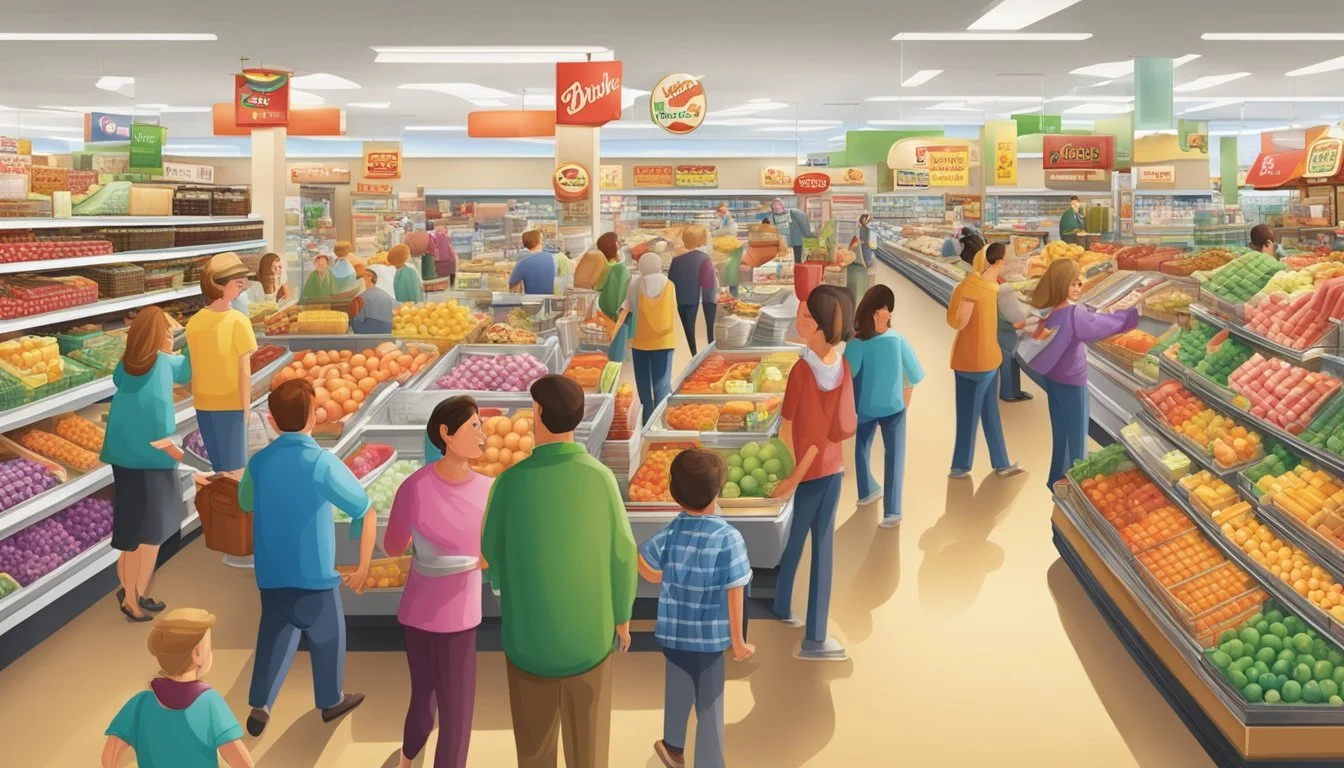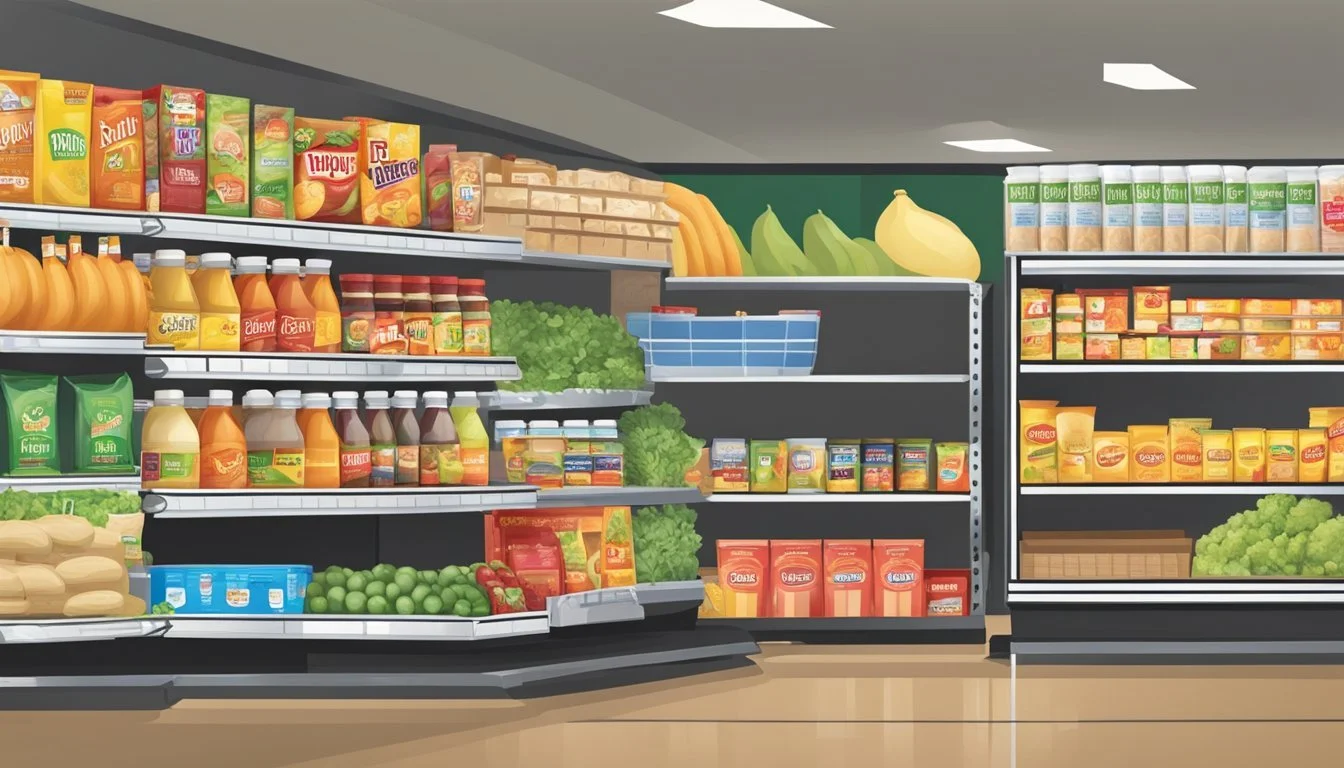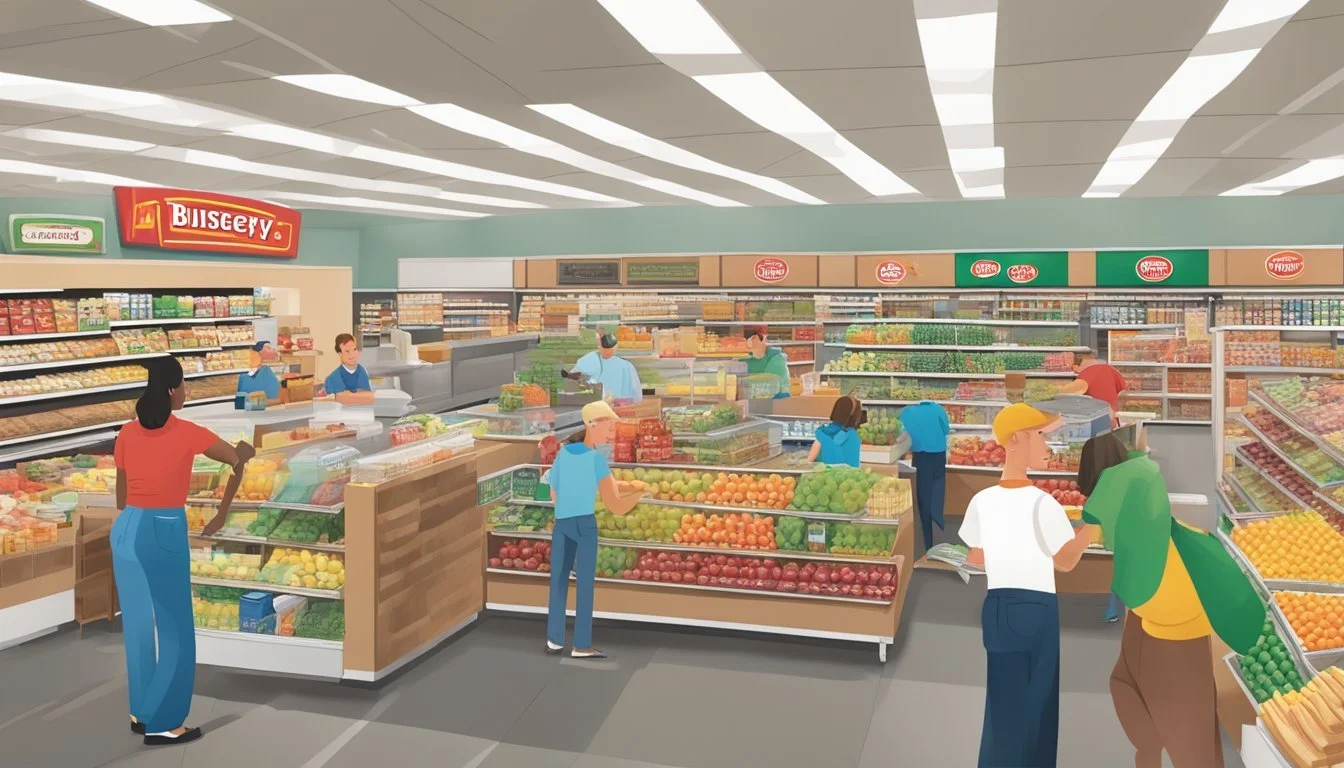Piggly Wiggly vs Winn-Dixie
A Comprehensive Comparison of Southern Supermarket Giants
Piggly Wiggly and Winn-Dixie are two well-known grocery chains in the southeastern United States, each with its own unique offerings and loyal customer base. Both stores strive to provide quality products and competitive prices to meet shoppers' needs.
Winn-Dixie is recognized for its store brand, SE Grocers, which offers savings of up to 20% compared to national brands across various product categories. The best value at Winn-Dixie is often found in everyday items like white sandwich bread and raw chicken. This focus on affordability through store-brand options can be appealing to budget-conscious consumers.
Piggly Wiggly, on the other hand, prides itself on its extensive product range that caters to diverse shopping needs. From pantry staples to specialty foods, Piggly Wiggly aims to be a one-stop shop for groceries. The store's selection includes dry goods, canned goods, and fresh produce, providing customers with ample choices for their weekly shopping trips.
History and Background
Piggly Wiggly and Winn-Dixie have deep roots in Southern grocery retail. Both chains pioneered innovative concepts that shaped modern supermarket shopping.
Origins of Piggly Wiggly
Clarence Saunders founded Piggly Wiggly in Memphis, Tennessee in 1916. He revolutionized grocery shopping by introducing the first self-service store. Customers could now browse aisles and select their own items, a radical departure from clerk-assisted shopping.
Saunders patented his "self-serving store" concept in 1917. The name "Piggly Wiggly" reportedly came to him as a whimsical idea, though its exact origin remains unclear.
The chain expanded rapidly across the Southern United States. By 1923, Piggly Wiggly had grown to over 1,200 stores. Its success led to Saunders becoming a millionaire before losing control of the company in a stock market battle.
Winn-Dixie's Beginnings
William Milton Davis founded Winn-Dixie's predecessor, Winn & Lovett, in 1925. The company started as a small chain of stores in Miami, Florida.
Davis expanded his business by acquiring other regional grocers. In 1939, he purchased 51% of Winn & Lovett's stock, gaining control of the company.
The Davis family continued to grow the business throughout the 1940s and 1950s. They focused on expansion in Florida, Georgia, and other Southern states.
Expansion and Growth
Piggly Wiggly's franchise model allowed for rapid growth across the South. The chain's innovative practices, such as price-marking each item, spread industry-wide.
By the 1950s, Piggly Wiggly had become a household name in many Southern communities. The company continued to operate as a franchise system, with independently owned stores using the Piggly Wiggly brand and methods.
Winn-Dixie grew through strategic acquisitions. In 1955, Winn & Lovett merged with Dixie Home Stores, creating Winn-Dixie Stores, Inc. This merger expanded the company's presence across the Southern United States.
Throughout the 1960s and 1970s, Winn-Dixie continued to acquire regional chains. These acquisitions helped solidify its position as a major player in the Southern grocery market.
Store Locations and Presence
Piggly Wiggly and Winn-Dixie have distinct regional footprints across the United States. Their store locations and accessibility vary significantly, impacting consumer choices in different areas.
Regional Footprints
Piggly Wiggly operates primarily in the southeastern and midwestern United States. The chain has a presence in approximately 17 states, with a strong concentration in Alabama, Georgia, and South Carolina.
Winn-Dixie, on the other hand, focuses its operations in the southeastern United States. The supermarket chain has stores in five states: Alabama, Florida, Georgia, Louisiana, and Mississippi.
Florida serves as Winn-Dixie's largest market, with numerous locations throughout the state. This concentrated presence gives Winn-Dixie an edge in certain regions.
Store Accessibility
Piggly Wiggly's store format often includes smaller, community-based locations. This approach allows the chain to serve rural and suburban areas effectively.
Many Piggly Wiggly stores operate under a franchise model, enabling local ownership and community integration. This structure can lead to variations in store offerings and experiences across locations.
Winn-Dixie typically features larger supermarket formats, primarily located in suburban and urban areas. The chain's stores are company-owned, ensuring a more consistent shopping experience across locations.
Winn-Dixie's focus on fewer states results in a denser store network within its operating regions. This concentration can provide greater convenience for customers in these areas.
Products and Selection
Winn-Dixie and Piggly Wiggly offer diverse product ranges to cater to different customer preferences. Both stores stock essential groceries, fresh produce, meats, and bakery items. Their selections include national brands and store-branded products.
Quality of Produce
Winn-Dixie emphasizes fresh produce, often sourcing from local farmers when possible. Their stores typically feature a wide variety of fruits and vegetables, including organic options.
Piggly Wiggly also provides fresh produce, though the selection may vary by location. Some Piggly Wiggly stores partner with local growers to offer seasonal fruits and vegetables.
Both chains strive to maintain quality standards for their produce departments. However, individual store management can impact the freshness and presentation of fruits and vegetables.
Availability of Meat and Deli
Winn-Dixie is known for its meat department, offering a range of cuts and options. Many locations have in-store butchers to provide custom cuts and advice.
The deli section at Winn-Dixie typically includes a variety of cold cuts, cheeses, and prepared foods. Some stores offer hot food bars and ready-to-eat meals.
Piggly Wiggly also maintains meat departments in its stores. The selection may be more limited compared to Winn-Dixie, but still covers most common cuts and types of meat.
Piggly Wiggly's deli offerings can vary by location, with some stores providing a full-service counter and others offering pre-packaged options.
Bakery and Baked Goods
Winn-Dixie stores often feature in-house bakeries, producing fresh bread, pastries, and cakes daily. Custom cake ordering is available at many locations.
The bakery department typically offers a mix of artisanal and standard bread options, along with sweet treats and desserts.
Piggly Wiggly's bakery offerings can differ between stores. Some locations have full-service bakeries, while others may focus on pre-packaged baked goods.
Both chains usually stock a variety of sliced bread, rolls, and buns from national brands alongside their bakery items.
Store Brand vs. National Brands
Winn-Dixie's store brand, SE Grocers, covers a wide range of products. It offers savings of up to 20% compared to national brands on items like bread and meat.
SE Grocers products aim to match the quality of national brands while providing cost savings to customers.
Piggly Wiggly also offers store-brand products, though specific information about their pricing and range is less readily available.
Both stores stock popular national brands across various categories, including canned goods, dairy, and pantry staples. This allows customers to choose between familiar brands and potentially more affordable store-brand alternatives.
Pricing and Deals
Pricing strategies and promotional offers play a crucial role in the grocery shopping experience. Both Piggly Wiggly and Winn-Dixie employ various tactics to attract budget-conscious customers.
Everyday Prices
Winn-Dixie's store brand, SE Grocers, offers savings of up to 20% compared to national brands. This includes everyday items like white sandwich bread and raw chicken.
Piggly Wiggly also provides its own store brands, focusing on both savings and quality. While specific percentage discounts are not available, these private label products generally offer competitive prices.
Both stores aim to keep their regular pricing competitive within local markets. Shoppers can often find lower prices on staple items compared to smaller convenience stores.
Discounts and Sales
Winn-Dixie frequently runs weekly specials and Buy One Get One Free (BOGO) deals. These offers typically rotate, covering various product categories throughout the month.
Piggly Wiggly also features regular sales, often highlighting seasonal items or popular brands. Their circular ads showcase these limited-time discounts.
Both chains may offer additional markdowns on perishable items nearing their sell-by dates. This can provide significant savings for customers willing to use products quickly.
Coupons and Loyalty Programs
Winn-Dixie operates the SE Grocers rewards program. Members earn points on purchases, which can be redeemed for discounts on future shopping trips.
The program also provides digital coupons and personalized offers based on shopping history. These can be loaded directly to the customer's loyalty card.
Piggly Wiggly's loyalty program may vary by location, as many stores are independently owned and operated. Some offer punch cards or other incentives for repeat customers.
Both stores generally accept manufacturer coupons, allowing customers to stack these discounts with store sales for maximum savings. Digital couponing apps can often be used at both chains, providing additional ways to reduce grocery bills.
Customer Experience
The customer experience at Piggly Wiggly and Winn-Dixie varies in several key aspects. Both stores aim to provide a pleasant shopping environment, but differ in their approaches to service, cleanliness, and overall atmosphere.
Service and Staff
Piggly Wiggly emphasizes a community-oriented approach to customer service. Staff members often know regular customers by name, creating a friendly and personalized shopping experience. This local touch is a hallmark of Piggly Wiggly's service model.
Winn-Dixie, as a larger chain, focuses on consistent service across locations. Employees are trained to be helpful and courteous, though the level of personalization may vary. Both stores generally offer assistance with finding products and carrying groceries to cars when needed.
Wait times at checkout can differ between the two stores. Piggly Wiggly's smaller size often results in shorter lines, while Winn-Dixie may have more registers open during peak hours to manage higher customer volumes.
Store Cleanliness
Cleanliness is a priority for both Piggly Wiggly and Winn-Dixie, but execution can vary by location. Piggly Wiggly stores, being independently owned, may show some inconsistency in cleanliness standards across different locations.
Winn-Dixie, with its corporate oversight, typically maintains a more uniform standard of cleanliness throughout its stores. Regular cleaning schedules are implemented to ensure floors, shelves, and produce areas remain tidy and hygienic.
Both chains pay special attention to the cleanliness of their meat and produce sections, recognizing the importance of food safety and presentation in these areas.
Shopping Atmosphere
Piggly Wiggly stores often have a cozy, small-town feel. The layout is usually compact and easy to navigate, making for a quick and efficient shopping trip. Decorations and signage frequently reflect local themes or community events.
Winn-Dixie offers a more modern shopping atmosphere with wider aisles and brighter lighting. Stores are typically larger, providing more space for product displays and specialty departments. The chain invests in creating a pleasant ambiance through music and well-organized product sections.
Both stores strive to create a welcoming environment, but Piggly Wiggly leans towards a homey, familiar feel, while Winn-Dixie aims for a polished, contemporary shopping experience.
Technology and Services
Piggly Wiggly and Winn-Dixie have embraced technological advancements to enhance their customers' shopping experiences. Both chains offer digital solutions and rewards programs to streamline the grocery shopping process and provide added value.
Digital Shopping Options
Winn-Dixie provides a robust online shopping platform. Customers can browse products, create shopping lists, and place orders for pickup or delivery through the Winn-Dixie website or mobile app. The chain has invested in user-friendly interfaces to make digital shopping intuitive and efficient.
Piggly Wiggly's digital offerings vary by location due to its franchise model. Some Piggly Wiggly stores offer online ordering and curbside pickup services. Others partner with third-party delivery platforms to provide home delivery options.
Both chains have implemented self-checkout kiosks in many of their stores. These systems reduce wait times and offer a contactless payment option for shoppers who prefer a quick, independent checkout process.
Rewards and Digital Coupons
Winn-Dixie's SE Grocers rewards program allows customers to earn points on purchases. These points can be redeemed for discounts on groceries or fuel. The program integrates seamlessly with their digital app, enabling easy tracking of points and rewards.
Winn-Dixie also offers digital coupons that can be loaded directly onto a customer's rewards card. This feature eliminates the need for paper coupons and automatically applies discounts at checkout.
Piggly Wiggly's rewards programs vary by location. Some stores offer digital coupons through their websites or apps. Others maintain traditional paper coupon systems or local discount programs.
Both chains provide e-receipts as an eco-friendly alternative to paper receipts. This feature allows customers to easily track their purchases and manage their budgets digitally.
Market Position and Competitiveness
Piggly Wiggly and Winn-Dixie occupy distinct positions in the competitive grocery landscape. Both chains face challenges from larger national retailers while leveraging their regional strengths and unique offerings.
Competition with Larger Chains
Piggly Wiggly and Winn-Dixie contend with retail giants like Walmart, Kroger, and Safeway. These larger chains often have pricing advantages due to economies of scale. Walmart's expansion into grocery has put pressure on regional chains to differentiate themselves.
Winn-Dixie has responded by focusing on its SE Grocers store brand, offering savings up to 20% compared to national brands. This strategy helps them compete on price while maintaining quality.
Piggly Wiggly stores have shown resilience in the South and Upper Midwest despite competition. Their cost-plus concept and customer loyalty have been key factors in their ability to withstand pressure from larger rivals.
Niche Market Strategy
Both chains have adopted strategies to carve out their niches in a crowded market. Piggly Wiggly emphasizes its extensive product range, including dry goods, canned items, and specialty foods. This wide selection caters to diverse customer needs and helps differentiate them from competitors.
Winn-Dixie focuses on fresh offerings and local products to attract customers. Their emphasis on quality produce and meats aims to set them apart from discount chains.
Piggly Wiggly's franchise model allows individual stores to tailor their offerings to local preferences. This flexibility helps them compete against more standardized national chains.
Both retailers leverage their regional roots and community connections to build customer loyalty. This approach helps them maintain market share in areas where they have a strong presence.
Corporate and Financial Health
Piggly Wiggly and Winn-Dixie have faced significant financial challenges in recent years. Both companies have undergone restructuring efforts to improve their market positions and financial stability.
Recent Performance
Piggly Wiggly operates as a franchise model, with independently owned stores. This structure has allowed the brand to maintain a presence in various markets despite financial difficulties. Individual store performance varies widely based on local management and market conditions.
Winn-Dixie, owned by Southeastern Grocers, has shown signs of improvement. The company has invested in store renovations and expanded its private label offerings under the SE Grocers brand. These initiatives aim to enhance customer experience and boost profitability.
Bankruptcy and Restructuring
Southeastern Grocers, Winn-Dixie's parent company, filed for Chapter 11 bankruptcy in 2018. The restructuring process allowed the company to reduce its debt by approximately $600 million. Winn-Dixie emerged from bankruptcy later that year with a streamlined store portfolio and improved financial footing.
Piggly Wiggly has not filed for bankruptcy as a brand. However, some individual franchise owners have faced financial difficulties. The decentralized nature of Piggly Wiggly's business model has helped the overall brand weather economic challenges more flexibly than some competitors.








